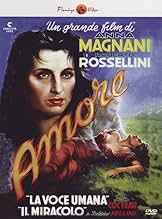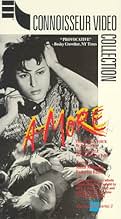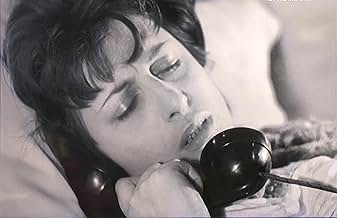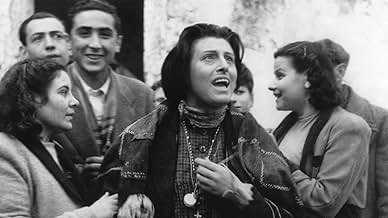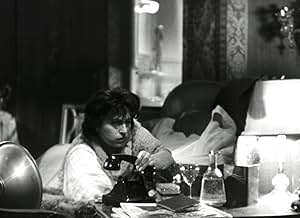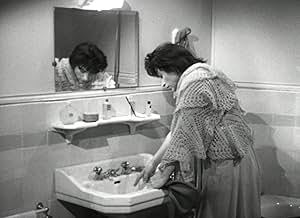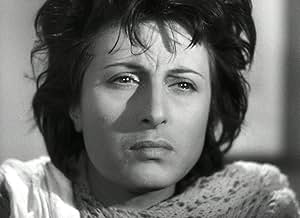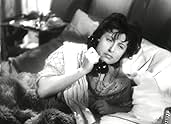IMDb RATING
6.9/10
2.1K
YOUR RATING
In part one, a heartbroken woman talks to her ex-lover on the phone. In part two, a pregnant woman believes she is carrying the child of Saint Joseph.In part one, a heartbroken woman talks to her ex-lover on the phone. In part two, a pregnant woman believes she is carrying the child of Saint Joseph.In part one, a heartbroken woman talks to her ex-lover on the phone. In part two, a pregnant woman believes she is carrying the child of Saint Joseph.
- Awards
- 2 wins & 2 nominations total
Featured reviews
When it was scheduled to be shown in New York, L' Amore was protested by religious leaders led by Cardinal Francis Spellman. The film board of New York quickly yanked it before even hitting the screen. After viewing this case, the Supreme Court ruled that for the first time that films are "a significant medium for the communication of ideas." It wasn't until this point that the First Amendment covered film as a freedom of speech. This didn't stop censorship, but it did open new doors.
Long unavailable in its entirety Roberto Rossellini's "L'Amore" remains one of his very greatest films. It is, in fact, two films; the second part, "The Miracle" has been shown separately and ran into censorship problems both in Italy and abroad. Fundamentally, it is a vehicle for Anna Magnani who is quite magnificent. In the first part, Cocteau's monologue "The Human Voice", she is the only person on screen, a lone woman on the telephone to the lover who has left her for another woman. For a good deal of the time Rossellini keeps the camera on that wonderful face and she is heart-breaking.
In the second part she is the deluded peasant seduced, and made pregnant, by none other than Federico Fellini , (who co-wrote the script with Rossellini and Tullio Pinelli). Magnani believes her seducer to be St Jospeh and the baby she is carrying to be some sort of new Messiah, (it was this that so offended the powers that be). Again she is magnificent, (Rossellini dedicated the film 'to the art of Anna Magnani"), in a role totally different from the part she plays in "The Human Voice". It is easy to see how this second part could be released separately from the first, (they are very different in tone), and this small masterpiece is as great a 'short' film as the cinema has given us. Nevertheless, seeing both parts together is testament to the genius of both director and star. Essential.
In the second part she is the deluded peasant seduced, and made pregnant, by none other than Federico Fellini , (who co-wrote the script with Rossellini and Tullio Pinelli). Magnani believes her seducer to be St Jospeh and the baby she is carrying to be some sort of new Messiah, (it was this that so offended the powers that be). Again she is magnificent, (Rossellini dedicated the film 'to the art of Anna Magnani"), in a role totally different from the part she plays in "The Human Voice". It is easy to see how this second part could be released separately from the first, (they are very different in tone), and this small masterpiece is as great a 'short' film as the cinema has given us. Nevertheless, seeing both parts together is testament to the genius of both director and star. Essential.
10sakatz
Contrary to the previous reviewer, "The Miracle" WAS released in New York City at the Paris Theater in 1950 (it was part of a 2-film anthology called "The Ways of Love"). It did well at the box office and went on to win Best Foreign Film from the NY Film Critics.
Cardinal Spellman objected to the film and denounced it in print. Since the film had already passed the NY censorship board without objection, he put pressure on the owner of the Paris Theater to stop showing the film before he was able to get the censorship board to reverse itself.
The film's distributor, Joseph Burstyn, went to court to defend the film and the Supreme Court, in a landmark ruling in 1952, decided the censorship board had violated the Constitution's separation of church and state clause and, furthermore, reversed its 1915 Mutual Film vs. Ohio ruling and determined that film was protected under the First Amendment.
Cardinal Spellman objected to the film and denounced it in print. Since the film had already passed the NY censorship board without objection, he put pressure on the owner of the Paris Theater to stop showing the film before he was able to get the censorship board to reverse itself.
The film's distributor, Joseph Burstyn, went to court to defend the film and the Supreme Court, in a landmark ruling in 1952, decided the censorship board had violated the Constitution's separation of church and state clause and, furthermore, reversed its 1915 Mutual Film vs. Ohio ruling and determined that film was protected under the First Amendment.
L'Amore is divided into two parts, the first called "A Human Voice", and the second named "The Miracle". Anna Magnani is wonderful at both. The first episode is about love and sadness. A woman is pursuing for a man who does not love her any longer. The whole episode occurs whitin a bedroom, with Anna and a telephone. The dialogue of Anna with her ex-husband is simply fantastic and very emotive. The second episode, more cryptic and stronger, shows us a medieval Italian town with all its beliefs and supersticions. A woman, Anna Magnani again, makes remember us the mistery of creation, with symbolic references to some christian icons (as virgins, poor people, saints, etc.). In sum, this is a wonderful film.
Initially banned in the UK, only the section entitled THE MIRACLE was shown by special permission of the London County Council. Somehow people seem to persist in interpreting the story as a Second Coming narrative, whereas the character played by Anna Magnani only believes she is to bear a "special" child as a reward for her piety. There is not a shred of evidence to suggest she believes she is carrying the Christ-child. Dubbed by the Vatican as "a sacrilegious blasphemy", it is ironic that, as an atheist, the power and emotional intensity of this film brought me the closest I have ever been to what could perhaps be termed a transcendental experience. A masterpiece.
Did you know
- TriviaWhen, in 1952, the "Il Miracolo" segment of the film was released in the United States as "The Miracle", it was the subject of a legal battle in which the Supreme Court ruled for the first time that motion pictures, like books and newspapers, were protected under the First Amendment to the Constitution.
- Quotes
La donna al telefono (segment "Una voce umana"): What? My black satin dress. Yes, I'm still wearing it. No, I didn't smoke. Just three cigarettes. I swear
- ConnectionsEdited into Histoire(s) du cinéma: Une histoire seule (1989)
- How long is Love?Powered by Alexa
Details
- Release date
- Country of origin
- Language
- Also known as
- Amore
- Filming locations
- Amalfi Coast, Salerno, Campania, Italy("Il Miracolo" segment)
- Production companies
- See more company credits at IMDbPro
- Runtime
- 1h 9m(69 min)
- Color
- Aspect ratio
- 1.37 : 1
Contribute to this page
Suggest an edit or add missing content

